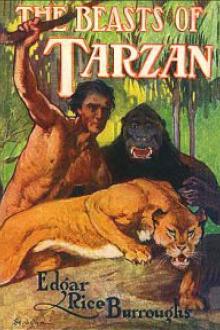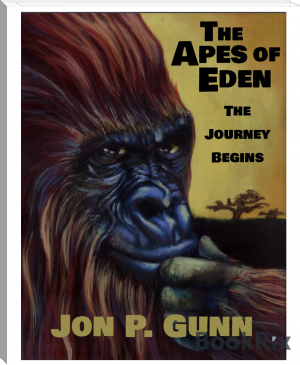Beasts of Tarzan, Edgar Rice Burroughs [ebook reader computer txt] 📗

- Author: Edgar Rice Burroughs
- Performer: 0809599848
Book online «Beasts of Tarzan, Edgar Rice Burroughs [ebook reader computer txt] 📗». Author Edgar Rice Burroughs
His manner toward her was surly, yet she never failed to meet him with a pleasant smile and a word of thanks when he brought her food to her, though more often than not she hurled the bulk of it through the tiny cabin port the moment that the door closed behind him.
During the days of anguish that followed Jane Clayton’s imprisonment, but two questions were uppermost in her mind—the whereabouts of her husband and her son. She fully believed that the baby was aboard the Kincaid, provided that he still lived, but whether Tarzan had been permitted to live after having been lured aboard the evil craft she could not guess.
She knew, of course, the deep hatred that the Russian felt for the Englishman, and she could think of but one reason for having him brought aboard the ship—to dispatch him in comparative safety in revenge for his having thwarted Rokoff’s pet schemes, and for having been at last the means of landing him in a French prison.
Tarzan, on his part, lay in the darkness of his cell, ignorant of the fact that his wife was a prisoner in the cabin almost above his head.
The same Swede that served Jane brought his meals to him, but, though on several occasions Tarzan had tried to draw the man into conversation, he had been unsuccessful. He had hoped to learn through this fellow whether his little son was aboard the Kincaid, but to every question upon this or kindred subjects the fellow returned but one reply, “Ay tank it blow purty soon purty hard.” So after several attempts Tarzan gave it up.
For weeks that seemed months to the two prisoners the little steamer forged on they knew not where. Once the Kincaid stopped to coal, only immediately to take up the seemingly interminable voyage.
Rokoff had visited Jane Clayton but once since he had locked her in the tiny cabin. He had come gaunt and hollow-eyed from a long siege of sea-sickness. The object of his visit was to obtain from her her personal cheque for a large sum in return for a guarantee of her personal safety and return to England.
“When you set me down safely in any civilized port, together with my son and my husband,” she replied, “I will pay you in gold twice the amount you ask; but until then you shall not have a cent, nor the promise of a cent under any other conditions.”
“You will give me the cheque I ask,” he replied with a snarl, “or neither you nor your child nor your husband will ever again set foot within any port, civilized or otherwise.”
“I would not trust you,” she replied. “What guarantee have I that you would not take my money and then do as you pleased with me and mine regardless of your promise?”
“I think you will do as I bid,” he said, turning to leave the cabin. “Remember that I have your son—if you chance to hear the agonized wail of a tortured child it may console you to reflect that it is because of your stubbornness that the baby suffers—and that it is your baby.”
“You would not do it!” cried the girl. “You would not—could not be so fiendishly cruel!”
“It is not I that am cruel, but you,” he returned, “for you permit a paltry sum of money to stand between your baby and immunity from suffering.”
The end of it was that Jane Clayton wrote out a cheque of large denomination and handed it to Nikolas Rokoff, who left her cabin with a grin of satisfaction upon his lips.
The following day the hatch was removed from Tarzan’s cell, and as he looked up he saw Paulvitch’s head framed in the square of light above him.
“Come up,” commanded the Russian. “But bear in mind that you will be shot if you make a single move to attack me or any other aboard the ship.”
The ape-man swung himself lightly to the deck. About him, but at a respectful distance, stood a half-dozen sailors armed with rifles and revolvers. Facing him was Paulvitch.
Tarzan looked about for Rokoff, who he felt sure must be aboard, but there was no sign of him.
“Lord Greystoke,” commenced the Russian, “by your continued and wanton interference with M. Rokoff and his plans you have at last brought yourself and your family to this unfortunate extremity. You have only yourself to thank. As you may imagine, it has cost M. Rokoff a large amount of money to finance this expedition, and, as you are the sole cause of it, he naturally looks to you for reimbursement.
“Further, I may say that only by meeting M. Rokoff’s just demands may you avert the most unpleasant consequences to your wife and child, and at the same time retain your own life and regain your liberty.”
“What is the amount?” asked Tarzan. “And what assurance have I that you will live up to your end of the agreement? I have little reason to trust two such scoundrels as you and Rokoff, you know.”
The Russian flushed.
“You are in no position to deliver insults,” he said. “You have no assurance that we will live up to our agreement other than my word, but you have before you the assurance that we can make short work of you if you do not write out the cheque we demand.
“Unless you are a greater fool than I imagine, you should know that there is nothing that would give us greater pleasure than to order these men to fire. That we do not is because we have other plans for punishing you that would be entirely upset by your death.”
“Answer one question,” said Tarzan. “Is my son on board this ship?”
“No,” replied Alexis Paulvitch, “your son is quite safe elsewhere; nor will he be killed until you refuse to accede to our fair demands. If it becomes necessary to kill you, there will be no reason for not killing the child, since with you gone the one whom we wish to punish through the boy will be gone, and he will then be to us only a constant source of danger and embarrassment. You see, therefore, that you may only save the life of your son by saving your own, and you can only save your own by giving us the cheque we ask.”
“Very well,” replied Tarzan, for he knew that he could trust them to carry out any sinister threat that Paulvitch had made, and there was a bare chance that by conceding their demands he might save the boy.
That they would permit him to live after he had appended his name to the cheque never occurred to him as being within the realms of probability. But he was determined to give them such a battle as they would never forget, and possibly to take Paulvitch with him into eternity. He was only sorry that it was not Rokoff.
He took his pocket cheque-book and fountain-pen from his pocket.
“What is the amount?” he asked.
Paulvitch named an enormous sum. Tarzan could scarce restrain a smile.
Their very cupidity was to prove the means of their undoing, in the matter of the ransom at least. Purposely he hesitated and haggled over the amount, but Paulvitch was obdurate. Finally the ape-man wrote out his cheque for a larger sum than stood to his credit at the bank.
As he turned to hand the worthless slip of paper to the Russian his glance chanced to pass across the starboard bow of the Kincaid. To his surprise he saw that the ship lay within a few hundred yards of land. Almost down to the water’s edge ran a dense tropical jungle, and behind was higher land clothed in forest.
Paulvitch noted the direction of his gaze.
“You are to be set at liberty here,” he said.
Tarzan’s plan for immediate physical revenge upon the Russian vanished. He thought the land before him the mainland of Africa, and he knew that should they liberate him here he could doubtless find his way to civilization with comparative ease.
Paulvitch took the cheque.
“Remove your clothing,” he said to the ape-man. “Here you will not need it.”
Tarzan demurred.
Paulvitch pointed to the armed sailors. Then the Englishman slowly divested himself of his clothing.
A boat was lowered, and, still heavily guarded, the ape-man was rowed ashore. Half an hour later the sailors had returned to the Kincaid, and the steamer was slowly getting under way.
As Tarzan stood upon the narrow strip of beach watching the departure of the vessel he saw a figure appear at the rail and call aloud to attract his attention.
The ape-man had been about to read a note that one of the sailors had handed him as the small boat that bore him to the shore was on the point of returning to the steamer, but at the hail from the vessel’s deck he looked up.
He saw a black-bearded man who laughed at him in derision as he held high above his head the figure of a little child. Tarzan half started as though to rush through the surf and strike out for the already moving steamer; but realizing the futility of so rash an act he halted at the water’s edge.
Thus he stood, his gaze riveted upon the Kincaid until it disappeared beyond a projecting promontory of the coast.
From the jungle at his back fierce bloodshot eyes glared from beneath shaggy overhanging brows upon him.
Little monkeys in the tree-tops chattered and scolded, and from the distance of the inland forest came the scream of a leopard.
But still John Clayton, Lord Greystoke, stood deaf and unseeing, suffering the pangs of keen regret for the opportunity that he had wasted because he had been so gullible as to place credence in a single statement of the first lieutenant of his arch-enemy.
“I have at least,” he thought, “one consolation—the knowledge that Jane is safe in London. Thank Heaven she, too, did not fall into the clutches of those villains.”
Behind him the hairy thing whose evil eyes had been watching his as a cat watches a mouse was creeping stealthily toward him.
Where were the trained senses of the savage ape-man?
Where the acute hearing?
Where the uncanny sense of scent?
Slowly Tarzan unfolded the note the sailor had thrust into his hand, and read it. At first it made little impression on his sorrow-numbed senses, but finally the full purport of the hideous plot of revenge unfolded itself before his imagination.
“This will explain to you” [the note read] “the exact nature of my intentions relative to your offspring and to you.
“You were born an ape. You lived naked in the jungles—to your own we have returned you; but your son shall rise a step above his sire. It is the immutable law of evolution.
“The father was a beast, but the son shall be a man—he shall take the next ascending step in the scale of progress. He shall be no naked beast of the jungle, but shall wear a loin-cloth and copper anklets, and, perchance, a ring in his nose, for he is to be reared by men—a tribe of savage cannibals.
“I might have killed you, but that would have curtailed the full measure of the punishment you have earned at my hands.
“Dead, you could not have suffered in the knowledge of your son’s plight; but living and in a place from which you may not escape to seek or succour





Comments (0)